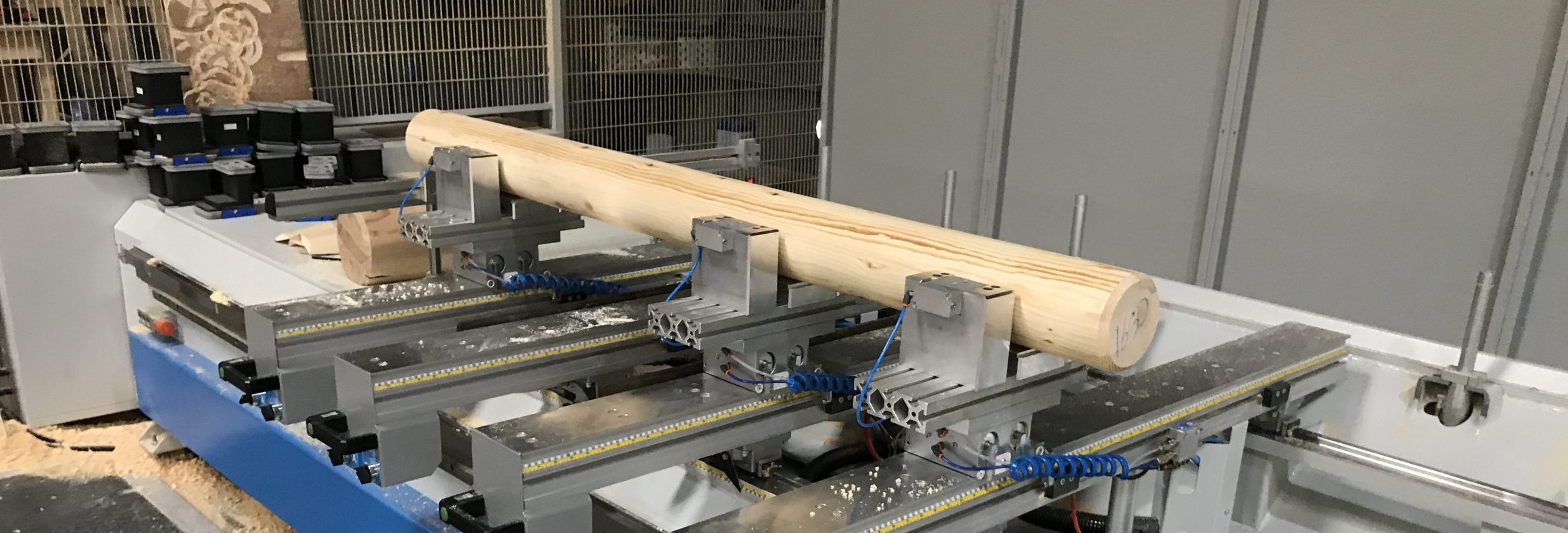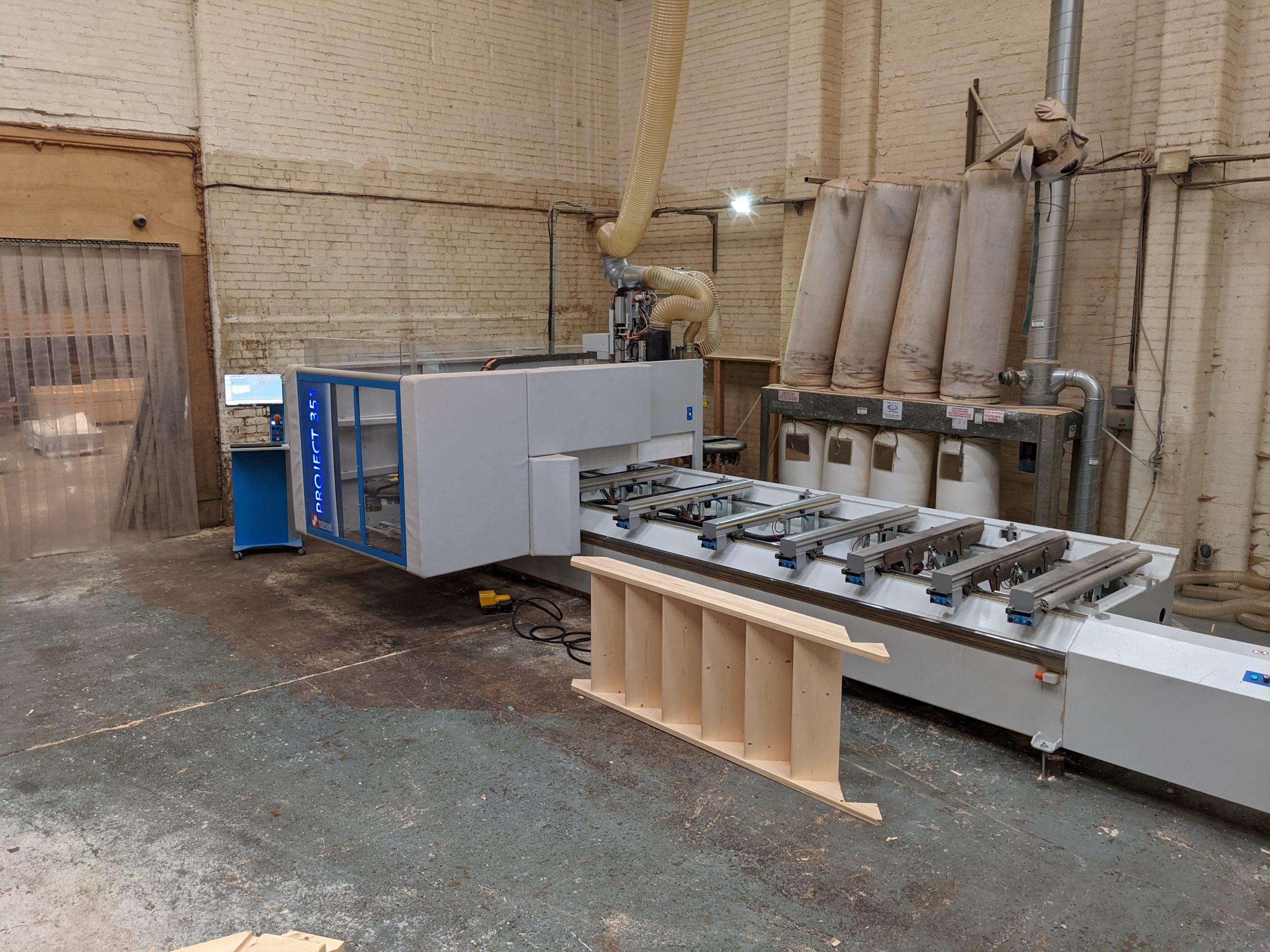
Read about our customers CNC stories

HSL are a family run business, producing high quality furniture for over 50 years. Their manufacturing process had been very traditional and labour intensive, using band saws and routers to machine the various parts needed for the frames of their renowned chairs.
The company decided to look at CNC, and turned to Masterwood for solutions. After discussing their needs and seeing a machine being demonstrated, they ordered their first CNC, the MW1538M through-feed, which was installed in early 2016. When asked why HSL chose Masterwood to supply their CNC machine, Kevin said “We spoke to other companies, but we felt that with Masterwood we got more quality and strength”
Within a year, HSL saw a dramatic change in their production, in particular how much time could be saved, and so placed an order for a second machine.
With the possibilities that the new technology offered, they started to redesign their existing products, making the base and foundations the same but requiring less different components. Kevin said “It enabled us to reduce the problems with our existing products. The internal frames were much improved, preventing the actions sticking we’d experienced. We were able to router the pieces, giving us far better accuracy”.
“It reduced our time and made assembly easier, resulting in a more productive workforce. We control the quality right from the start of the product, until it goes out the door. If the frame is right, we have the accuracy all the way through the factory. We’ve decreased the amount of parts we have to rework or adjust, saving us time. We wouldn’t have been able to grow like this without the CNCs”.
As production and demand continued to increase for HSL, a third CNC was added in December 2018, then a fourth in June 2021, another MW1538M.
We’ve decreased the amount of parts we have to rework or adjust, saving us time. We wouldn’t have been able to grow like this without the CNCs” – Kevin – Manufacturing & Design Director
Father and Son Tony and Tom set up Southern Fire doors in 2011 producing doorsets and bespoke joinery using classic machines and production methods.
In 2016 they decided to focus on doors and began looking into CNC machines. Having looked at various suppliers, they chose Masterwood who demonstrated the basic CAD/CAM MasterWorks software working with the CNC to fully machine doors and frames.
They placed and order for a Project 250, an entry level CNC but fully capable for the work required and within their budget. Once delivered, Masterwood GB provided technicians to set the machine up and provide on-site training for the software and machine, showing how to create parametric programmes for their doors and frames.
Within five months of the installation Tony told us “We are now looking at jobs with various companies that we could never have considered pre CNC, this is a new world for us but Tom has grabbed it with both hands and not only speeded up our doorset production, but has found time to design various products that were sold off before Christmas for charity”
Owner Tony summed it all up when he said “what used to take us about two hours to produce a door and frame fully worked is now taking 15 minutes, or less”.
“What used to take us about two hours to produce a door and frame fully worked is now taking 15 minutes, or less” – Tony – Owner
HMS Joinery of Newcastle under Lyme was set up in 1990 and grew to a workforce of 30. Although it became successful in winning contracts from national house builders, the staff, including owner, Harry Murray, were regularly working a seven day week in order to get the work out. “Using traditional methods to make staircases is so labour intensive, we had to come in every day to keep up with the orders, which was taking its toll on everyone,” said Mr Murray. “Due to all the overtime that was being paid out it was eating up the profits, the long-term future of the business looked uncertain,” he added
The turn-round in HMS’s fortunes began when it bought a Masterwood Atlas XL CNC machining centre in 2002. It took over the production of the staircases, replacing a semi-automatic trenching machine and the need for other tasks to be carried out by hand. It boosted profitability by more than 30%, and by cutting out the need for substantial amounts of overtime it still allowed a 40% increase in production.
It used to take a day to produce a standard staircase with kite winders, which was now being done in about three hours.
In 2005 the company was producing between 50 and 60 staircases per week, based on five and a half working days, with minimal overtime.
The CNC was supplied with MasterStair, Masterwood’s own Cad/Cam software for the quick and easy design of staircases, producing drawings, cutting sheets, and a CNC programme for each component.
As well as being ideal for bespoke work, the MasterStair software really comes into its own with batch staircase production. “The bottom line is that we are saving hugely on overtime payments, which has made the business far more profitable,” says Mr Murray. “Our customers are impressed with both the fast service we now provide and the first class quality of work. We can now take on large batch orders with confidence, knowing that we can meet the delivery dates. We are able to build up batches of stairs in advance, we are no longer constantly working under pressure,”
Within a short time of the second machine arriving, the house market started to grow again and it was back to more and more stairs. Following various discussions in 2017 between HMS and Masterwood it was decided a third CNC was required as the company was now back working 24/7 to keep up with all their stair orders.
Before the third machine arrived a new factory became available in nearby Stoke on Trent, the new Project 460 was set up here in August 2017 and over the following months machines and work was gradually moved from the old factory to the new.
The new work shop has allowed the three Masterwood CNC machines to be in a line producing all the strings, newels, winder and special treads, plus newel caps from the string offcuts. “The new works has allowed us to increase production due to the better layout and more space, everything has become more efficient” said workshop manager Craig Avramovic. Separate rooms now set up allow balustrading to be fully assembled and a new spray shop has also been added.
The Project 460 is a 5200mm bed length and can take tooling up to 250mm diameter, plus other “options” like horizontal router, a fourth axis, and extra tooling positions can easily added at any time if found to be required.
“Our customers are impressed with both the fast service we now provide and the first class quality of work. We can now take on large batch orders with confidence, knowing that we can meet the delivery dates. We are able to build up batches of stairs in advance, we are no longer constantly working under pressure,” – Harry Murray